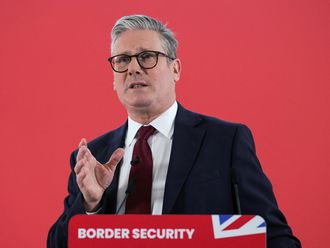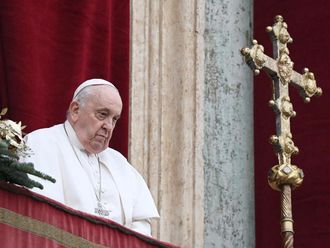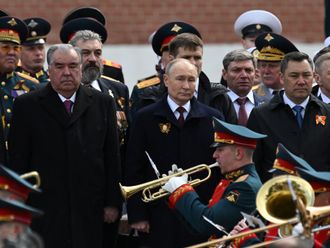London: An urgent inquiry has been launched after The Mail on Sunday discovered dentists are being offered cash incentives to remove healthy milk teeth from children to harvest stem cells.
Hundreds of dentists are preparing to offer parents the £1,300 (Dh7,456) service, marketed as a way to protect against future diseases because stem cells can turn into any kind of cell and help repair damaged tissue.
Dentists will be rewarded with a cash bonus of £100 for each patient who supplies a tooth to be processed.
There is no evidence as yet that dental stem cells can be used for medical purposes but research is ongoing.
And last night critics said healthy teeth should never be removed unless for dental reasons. It appears that any other removal could breach strict standards set down by the General Dental Council.
The GDC rules state dentists must put patients’ interests before their own or those of any organisation or business.
The British Dental Association, which represents dentists, also said it would hold an investigation into the practice.
Professor Paul Sharpe of the Dental Institute at King’s College London, a world expert on the use of dental stem cells, said: “No dentist would ever or should ever remove a tooth solely so they can bank a stem cell, certainly not from a child.”
Families are being offered the service by British company Precious Cells International, which recommends children’s teeth should be extracted by dentists rather than waiting for them to fall out naturally.
It is understood most dentists signed up to the scheme will extract teeth only when they have started to wobble or for orthodontic purposes. But it still means children could need a local anaesthetic for a procedure not clinically necessary.
The teeth are sent to Precious Cells’ laboratory at Brunel University in Uxbridge, West London, where stem cells are extracted from tissue close to the root, known as dental pulp. The cells are frozen and stored at a cell bank in Oxfordshire.
The Precious Cells website says: “The ideal opportunity to harvest dental stem cells occurs when children and young adults are losing their deciduous [baby] teeth either through natural exfoliation or ideally through simple extraction.”
Children start losing their baby teeth from the age of five.
Precious Cells says it has already signed deals with 60 dentists. Private dental firm Denplan, which has 6,500 dentists and 1.8 million patients, is also recommending it.
Denplan’s publicity material states: “For parents, the opportunity to store their children’s stem cells from their milk teeth offers a unique health insurance promise as stored stem cells can reduce the need for donor matching and rejection in the event of serious illness in the future the value to your children could be priceless.”
The Precious Cells website claims it is involved in “a significant number” of trials, and the cells could potentially be used to repair cartilage, bone, nerve and heart tissue damage. The banking of stem cells from umbilical cords, bone marrow and liposuction fat is a growing industry and there are hopes they could be used in the future to cure conditions from diabetes to Alzheimer’s.
Using a patient’s own stem cells is considered most effective because there is less chance they will be rejected.
The Precious Cells stem cell bank was opened in 2010 by molecular biologist Hussain Salem, 32, and his 27-year-old wife Nasreen, a dentist.
Salem researched gene and cell therapies at Imperial College London after completing a PhD at Manchester University. He reportedly put £1 million into his business, which has yet to yield a profit. The main costs went on building high-spec laboratories in order to meet criteria set by the Human Tissue Authority, which licenses and regulates premises used to store body tissue.
Precious Cells is storing about 100 teeth from private patients, mostly from overseas. About 15 are from British children, and in each case they were removed for dental reasons, such as having a brace fitted.
Salem said it would be unusual for a parent to permit dentists to remove teeth that were not already wobbly.
He said: ‘They go through a full consent process. If somebody asks, Take this tooth out for the purpose of stem cell banking, then they have made that choice to do that and they fully understand the risks.’ Dentists pay up to £200 to subscribe to the Precious Cells service. The cost to parents is £1,300 of which the dentist gets £100. The company has refused to identify the dentists who plan to offer the service.
A Denplan spokesman said: ‘There’s no impetus on the dentist to remove the tooth. It would be a highly unethical thing just to remove a tooth to get £100.’
The British Dental Association said: ‘We will look at this development carefully and draft guidance for members.’
The General Dental Council said: ‘We require dentists to act always in their patients’ best interests. We will investigate dentists who fail to meet this standard and can restrict or stop a dentist practising if these standards are not met.’












